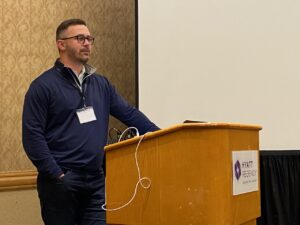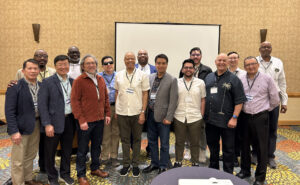
DALLAS (BP)–Southern Baptist leaders with ties to First Baptist Church in Dallas offered remembrances of W.A. Criswell, recounting his leadership, vision and influence before a crowd of 2,700 gathered for the Jan. 16 memorial service.
Robert Jeffress, senior pastor of First Baptist Church, Wichita Falls, Texas, who grew up under Criswell’s ministry and later served on staff as youth minister, recalled that Time magazine once described Criswell as “a country preacher with a Ph.D.” Criswell taught him that the preacher’s only message is the Bible, Jeffress said. Over the course of 17 years and eight months, Criswell preached through the entire Bible, Jeffress remembered, adding that the church could not contain the crowds that came to hear the Word of God.
Criswell also taught him as a young minister that the preacher is to work hard at his job, Jeffress said, noting that Criswell told ministerial students that the preacher ought to know about his subject, the Bible, as thoroughly as a doctor knows medicine and a lawyer knows law. Criswell also communicated that the preacher must be a good pastor.
“The same Dr. Criswell that might be parsing Greek verbs in the morning might also be putting on an Easter bunny costume in the afternoon to go to children’s camp,” Jeffress said, citing the Sunday school teacher who asked a little boy when he was saved. “He replied, ‘When Dr. Criswell was a rabbit.'”
Asking every member of the audience who had been personally touched by Criswell’s ministry to stand, Jeffress asked family members to notice that nearly every person present had stood. “This is the lasting legacy of Dr. W.A. Criswell.”
Southeastern Baptist Theological Seminary President Paige Patterson described his former pastor’s vision, saying Criswell belonged to “the genre of the great prophets of old.” Though known for building a great church in the early years of his ministry, “the keenest of his literary insights began to flow from his pen” in the 1950s and 1960s. Patterson cited the influence of Criswell’s writings at critical junctures in history, speaking first of the book “Did Man Just Happen?” as an answer to Darwinism. In 1958, “Five Great Questions” offered a confident vision of the future, Patterson said.
The five-volume commentary on Revelation between 1962 and 1966 provided “the greatest testimony in the history of Christianity to preached sermon series.” The 1969 volume “Why I Preach That the Bible Is Literally True” revealed Criswell’s concern that “the future of any denomination laid squarely in its confidence in God’s Word.”
On New Year’s Eve of 1969, Criswell preached throughout the night and morning hours, Patterson recalled, providing the text for “The Scarlet Thread of Redemption.” In 1979 the Criswell Study Bible dealt with problem texts and a Criswell’s Guidebook for Pastors in 1980 offered a compass to those coming after him.
Patterson spoke further of Criswell’s vision by expanding to worldwide ministry, establishing Criswell College (initially known as Criswell Bible Institute), the Criswell Foundation, First Baptist Academy, School of the Prophets, KCBI radio station and Dallas Life Foundation. Visionary sermons included Criswell’s message, “Death in Detente,” which was embraced by President Ronald Reagan, and the 1985 Pastors’ Conference address “Whether We Live or Whether We Die” before 45,000 Southern Baptists in Dallas.
In a more personal sense, Patterson said Criswell taught him about the providence of God in weathering the storms of life. In the midst of one such storm while serving as president of Criswell College, Patterson said he listened to Criswell’s response to his agitated condition. “He said, ‘Lad, you’re all worked up.'”
Patterson remembered Criswell telling him, “‘Any faithful preacher of the Word of God will spend his life in a storm of some kind. You can’t do anything about that. All you can be certain of is that you remain personally in the center of God’s will. Hunker down in the old ship of Zion and ride out the storm and enjoy the amazing and tender providences of God as you go through the storm.”
When Criswell sailed through the roughest storm of his life on the morning of Jan. 10, Patterson described how the pastor’s longtime friend, Jack Pogue, offered reassurance by reading the promises of God for a heavenly home. “Somewhere along the line, Mr. Pogue’s voice receded into the background and I’m absolutely convinced he heard a peaceful voice that said, ‘Peace, be still.’ And the sea stopped its raging and he heard another voice that said, ‘Well done, thou good and faithful servant. Enter into the glory of God.”
Annuity Board President O.S. Hawkins, a former pastor of First Baptist, Dallas, said those who one day may be prone to rewrite history and seek to temper Criswell’s influence should know that “what Charles Haddon Spurgeon was to the Downgrade Controversy of 19th-century England, he was much more to 20th century America.”
Hawkins said, “Many will remember him in various ways — a photo, a Bible, baptism, a letter, a sermon, a touch. I’ll remember him in his pajamas on Saturday evenings when I would go by Swiss Avenue and he would be back in his study. I would share with him what I was preaching the next morning at this sacred desk. We would talk and kneel at that sofa that was there and every Saturday he would put his hands on my head and pray for me.”
Hawkins noted that the word for influence is based upon the Latin reference “in flow,” creating a word picture of a mighty river force merging with a smaller tributary that is caught up and carried away in the swift current. “We’re here today because we’ve all been caught up in his flow,” Hawkins said of Criswell, quick to add that Jesus Christ was the source of that river.
“And so I say, flow river flow, flood the nations with grace and mercy. Send forth your Word, Lord, and let there be light,” Hawkins said, quoting the hymn, “Shine, Jesus, Shine.”
“W.A. Criswell was our apostle Paul,” Hawkins continued, adding “he brought an intellectual pursuit to the pulpit that was coupled with a passionate pastor’s heart. When we heard him preach, we aspired to learn the languages of the Bible; when we heard him so naturally expound the Greek for over half a century from this pulpit, he stretched us to move beyond simple sermons or modern motivational preaching where we just took a Scripture and skimmed across the top, to preach the Word of God.”
And like Caleb, Criswell was “still looking for a new mountain to climb,” Hawkins said, noting that he was like David, who led Israel with the integrity of his heart and the skillfulness of his hands. Hawkins spoke of knowing preachers who had a tremendous amount of intellect, intensity and passion that moved congregations, or keen insight and discernment. But, unlike Criswell, “they had little integrity and are no longer in the race.”
Just as the hearts of David and Jonathan “were knitted together in ministry,” Hawkins said he wished every preacher could have a friend like Criswell had in Jack Pogue.
Like Barnabas, Criswell was a constant encourager, Hawkins said. And like John on the Isle of Patmos, Hawkins said no one influenced premillennial thought more than W. A. Criswell who “loved his glorious appearing.”
And like his two heroes, John Chrystostom and Charles Haddon Spurgeon, Criswell left many published sermons contained in 54 books, Hawkins said. “We can’t tell where Chrystostom inflected the text or hear the passion in his voice. But for the first time in history, thanks to the Criswell Foundation, anyone in this world can enter the World Wide Web at wacriswell.com and not just read his text and his sermons, but see him on that videostream and hear the passion in his voice.” Hawkins said 57,000 people visited the website on the day of Criswell’s death as the word spread.
Hawkins said Criswell, like Spurgeon, built a great church, left us a college and influenced a world. He turned to First Baptist’s current pastor, Mac Brunson, and called him “God’s man in God’s place in God’s time,” as the audience responded with applause. “The mighty river of W.A. Criswell’s influence flows now into the 21st century,” Hawkins added, speaking of the many Southern Baptist leaders present who were inspired by Criswell. “While people are talking about women in ministry being important today,” Hawkins credited Criswell with recognizing the contribution of women for decades at First Baptist Church.
Closing with words from one of Criswell’s sermons on heaven, Hawkins said the pastor did not find his hope “in the speculation of modern theology and secularism,” but in “the old text” and “the old song.” He quoted, “‘Let me trust my soul in the same Lord, the lyric and melody are from God,'” Hawkins said, recalling Criswell’s recitation from “There Is a Fountain.”
Remembering Criswell’s prediction that he would not be found among the patriarchs, prophets, psalmists, apostles or martyrs to be seen in heaven, Hawkins quoted, “‘I belong to that great throng of the redeemed. Wash and be clean. Trust and be saved. Look and live.'”
Hawkins asked, “Where is W.A. Criswell? Not here, but this is the house he lived in. He is a part of that great multitude which no one can number. He lived for this moment. He preached for this moment. It is his coronation day and we would not hold him back if we could. He is a great part of that multitude, not on his own merits, as great and noble as they were, but because of our Savior’s love.”
Drawing upon the words of Criswell’s favorite hymn, Hawkins quoted, “‘Dear dying lamb, thy precious blood shall never lose its power ’til all the ransomed church of God be saved to sin no more.'” He added, using a familiar expression of Criswell’s, “We’ll carry on, with a prayer in our hearts and a Bible in our hand.”
–30–
















